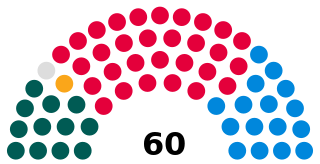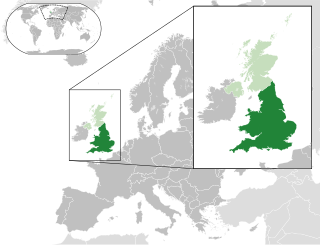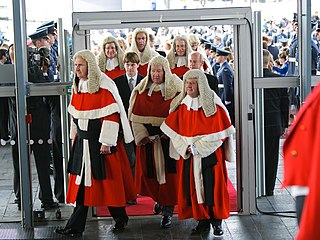
The United Kingdom has three distinctly different legal systems, each of which derives from a particular geographical area for a variety of historical reasons: English and Welsh law, Scots law, Northern Ireland law, and, since 2007, calls for a fourth type that of purely Welsh law as a result of Welsh devolution, with further calls for a Welsh justice system.

The Senedd, officially known as the Welsh Parliament in English and Senedd Cymru in Welsh, is the devolved, unicameral legislature of Wales. A democratically elected body, it makes laws for Wales, agrees to certain taxes, and scrutinises the Welsh Government. It is a bilingual institution, with both Welsh and English being the official languages of its business. From its creation in May 1999 until May 2020, the Senedd was known as the National Assembly for Wales.

England and Wales is one of the three legal jurisdictions of the United Kingdom. It covers the constituent countries England and Wales and was formed by the Laws in Wales Acts 1535 and 1542. The substantive law of the jurisdiction is English law.

The Welsh Government is the devolved government of Wales. The government consists of ministers and deputy ministers. It is led by the first minister, usually the leader of the largest party in the Senedd, who selects ministers and deputy ministers with the approval of the Senedd. The government is responsible for tabling policy in devolved areas for consideration by the Senedd and implementing policy that has been approved by it.

Politics in Wales forms a distinctive polity in the wider politics of the United Kingdom, with Wales as one of the four constituent countries of the United Kingdom (UK).
The Royal Commission on the Constitution, also referred to as the Kilbrandon Commission or Kilbrandon Report, was a long-running royal commission set up by Harold Wilson's Labour government to examine the structures of the constitution of the United Kingdom and the British Islands and the government of its constituent countries, and to consider whether any changes should be made to those structures. It was started under Lord Crowther on 15 April 1969, Lord Kilbrandon took over in 1972, and it finally reported on 31 October 1973.

Welsh law is an autonomous part of the English law system composed of legislation made by the Senedd. Wales is part of the legal jurisdiction of England and Wales, one of the three legal jurisdictions of the United Kingdom. However, due to devolution, the law in Wales is increasingly distinct from the law in England, since the Senedd, the devolved parliament of Wales, can legislate on non-reserved matters.

The Ministry of Justice (MoJ) is a ministerial department of His Majesty's Government, headed by the Secretary of State for Justice and Lord Chancellor. Its stated priorities are to reduce re-offending and protect the public, to provide access to justice, to increase confidence in the justice system, and to uphold people's civil liberties. The Secretary of State is the minister responsible to Parliament for the judiciary, the court system, prisons, and probation in England and Wales, with some additional UK-wide responsibilities, e.g., the UK Supreme Court and judicial appointments by the Crown. The department is also responsible for areas of constitutional policy not transferred in 2010 to the Deputy Prime Minister, human rights law, and information rights law across the UK.

The Counsel General for Wales is the Welsh Government's Law Officer, which means the government's chief legal adviser and representative in the courts. In addition to these "lawyer" roles the Counsel General also works to uphold the rule of law and integrity of the legal community in Wales, and has a number of important specific statutory functions, some of which are to be exercised independently of government and in the public interest.

The Office for Budget Responsibility (OBR) is a non-departmental public body funded by the UK Treasury, that the UK government established to provide independent economic forecasts and independent analysis of the public finances. It was formally created in May 2010 following the general election and was placed on a statutory footing by the Budget Responsibility and National Audit Act 2011. It is one of a growing number of official independent fiscal watchdogs around the world.

The Supreme Court of Nauru was the highest court in the judicial system of the Republic of Nauru till the establishment of the Nauruan Court of Appeal in 2018.

In the United Kingdom, devolution is the Parliament of the United Kingdom's statutory granting of a greater level of self-government to the Scottish Parliament, the Senedd, the Northern Ireland Assembly and the London Assembly and to their associated executive bodies the Scottish Government, the Welsh Government, the Northern Ireland Executive and in England, the Greater London Authority and combined authorities.
From 1949 to 2005, magistrates' courts committees (MCCs) had overall responsibility for management of the magistrates' courts service within their areas in England and Wales.

Roger John Laugharne Thomas, Baron Thomas of Cwmgiedd, FLSW is a British judge. He served as Lord Chief Justice of England and Wales from 2013 to 2017.
The Commission on Devolution in Wales, also known as the Silk Commission, was an independent commission established by Welsh Secretary Cheryl Gillan on 11 October 2011. The commission was based at the Wales Office Cardiff headquarters, at Cardiff Bay and met for the first time on 4 November 2011 at the Millennium Stadium, Cardiff. The commission reviewed the case for the devolution of fiscal powers to the Welsh Assembly, now the Senedd, and considered the case for increasing the powers of the assembly. It published its findings in two parts.

Federalism in the United Kingdom aims at constitutional reform to achieve a federal UK or a British federation, where there is a division of legislative powers between two or more levels of government, so that sovereignty is decentralised between a federal government and autonomous governments in a federal system.

Welsh devolution is the transfer of legislative power for self-governance to Wales by the Government of the United Kingdom.
The Law Council of Wales is an organisation in Wales which promotes legal education, awareness of Welsh law, provision of teaching the law in Welsh and to assist students in law training.

The justice system in Wales is currently part of the England and Wales justice system. There have been proposals for a Wales-only justice system under the control of the Senedd to deal with Welsh issues.
There have been calls for further Welsh devolution, increasing the autonomy for Wales, since the Welsh legislature of the Senedd was founded following the 1997 Welsh devolution referendum.














